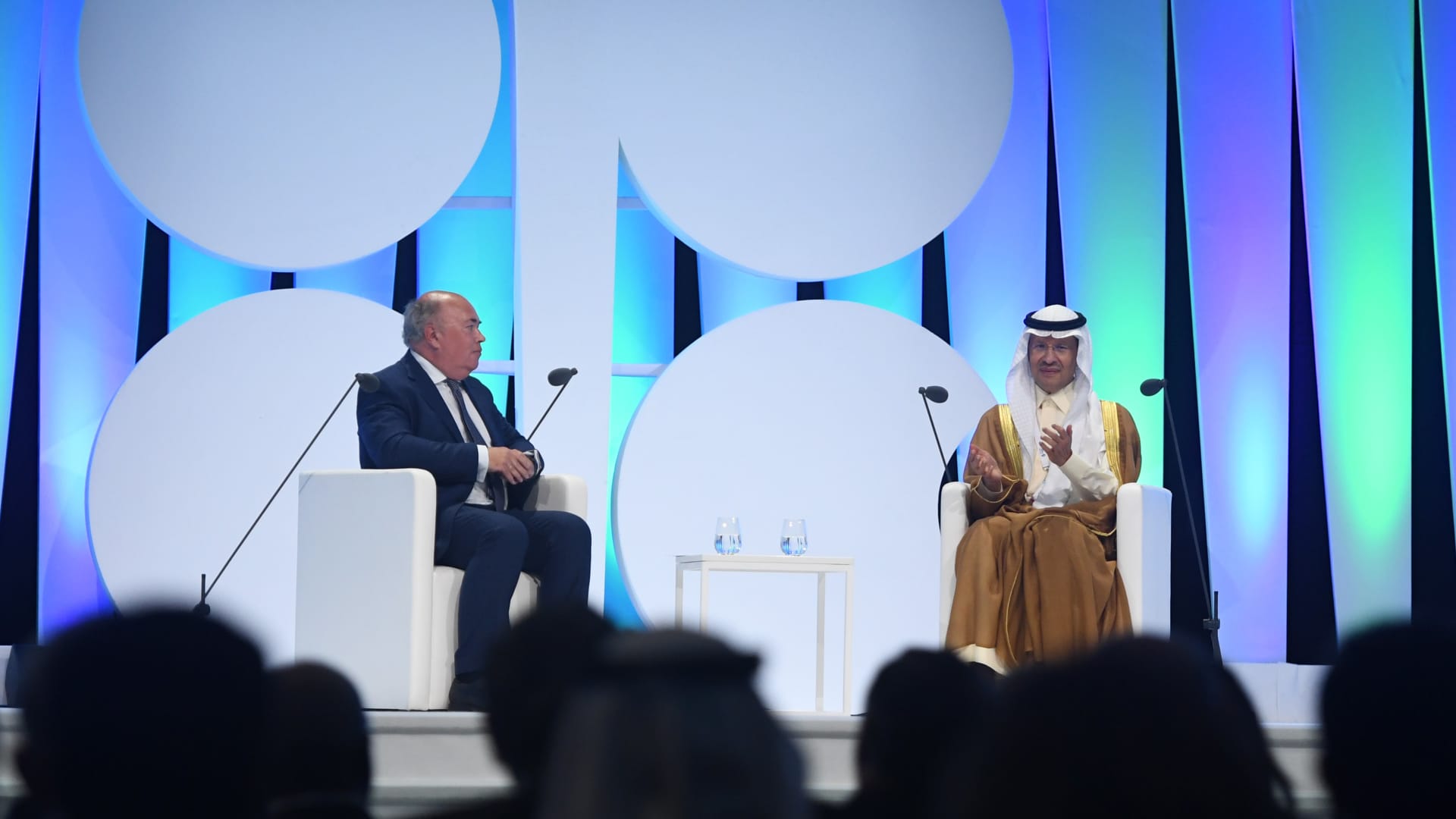Saudi Arabia’s Energy Minister Prince Abdulaziz bin Salman speaks during the 8th OPEC International Seminar in Vienna, Austria, July 5, 2023.
Xinhua News Agency | Xinhua News Agency | Getty Images
An influential oil producers’ alliance could collapse if unity dissolves around output policy, according to the managing partner of investing group Clean Energy Transition.
Speaking to CNBC’s “Street Signs Europe” on Thursday, Per Lekander said waning oil demand growth and a lack of cooperation may facilitate the demise of OPEC+ — a group of 23 nations that produces roughly 40% of the world’s crude oil.
The breakup of OPEC+, Lekander said, could send oil prices careening to as low as $35 per barrel.
“In a growing market, time is your friend. You just need to wait a bit and things tighten up and improve,” Lekander said. “In a declining market, time is your enemy. You have to keep cutting, keep cutting, keep cutting.”
He added, “The more negative growth [there] is, and the less cooperation you have — and remember the last OPEC decision, it was really the Saudis doing it on their own … so I would say, if my forecast is correct, and I’m very sure it is … it is going to break.”
A spokesperson for OPEC was not immediately available to comment.
OPEC+ has been trimming oil production since November. Oil prices, which are down sharply year-to-date, were trading slightly higher on Thursday afternoon.
Brent crude futures with September expiry were up around 0.8% at $83.53 a barrel at around midday London time, while U.S. West Texas Intermediate crude futures with September delivery rose 1% to trade at $79.56 a barrel. Both contracts are up over 12% so far this month.
“There was a period in the 1990s and the 2000s where supply was so much, they couldn’t jack up the price, but for most of the time, the oil price since 1974 has been artificially too high,” Lekander said.
“If the cartel can’t operate, I would say short-term you go to $35 and mid-term probably $45,” he added.
The OPEC+ group has sought to distance itself from accusations of cartel behavior, saying its policies target global supply inventories, rather than specific fixed prices. Nevertheless, some Middle East nations in the coalition, which heavily depend on fossil fuel revenues, list oil price assumptions and forecasts in their national budget plans.
OPEC and allies
The Organization of Petroleum Exporting Countries was initially formed in 1960 by five founding members: Iran, Iraq, Kuwait, Saudi Arabia and Venezuela. The alliance rose to international prominence through the following decade and has gradually expanded. OPEC joined forces with 10 non-OPEC partners — including heavyweight Russia — to jointly agree production policy in 2016, informally creating the coalition known as OPEC+
OPEC itself is actively seeking to recruit new members to the alliance, Secretary-General Haitham al-Ghais said in early July.
OPEC+ officials have frequently stressed the group’s unity in policy-making, although allied countries typically also vie to protect national interests when accepting output commitments. OPEC+ cooperation briefly ceased for one month in 2020, triggering a price war as Russia and Saudi Arabia flooded the market. The alliance later reunited in May of that year, agreeing stark production cuts to address the drop in global demand triggered by lower transport fuel consumption, after the onset of the Covid-19 pandemic. Since then, the OPEC+ alliance has been careful to telegraph unity in its decision-making, including in its voluntary production cuts.
In addition to their coalition commitments, several OPEC+ members are now carrying out 1.66 million barrels per day of discretionary output declines until the end of 2024. Saudi Arabia and Russia are further implementing an additional 1 million-barrels-per-day and a 500,000 barrels-per-day drop in their production and exports over July and August, respectively.
The U.S., which is not a member of the OPEC+ group, has repeatedly called on the alliance to pump more to help the global economy and has criticized Riyadh’s cooperation with Moscow following Russia’s full-scale invasion of Ukraine.
Saudi Arabia, meanwhile, has frequently ignored Washington’s demands and reportedly said earlier this month that it would do “whatever necessary” to support the market.
Both OPEC+ officials and the Paris-based International Energy Agency have signaled a potential supply crunch in the second half of the year, when the institutions anticipate a pickup in demand.
A technical committee of the OPEC+ group, the Joint Ministerial Monitoring Committee, will meet early next month to assess compliance and market fundamentals. The JMMC cannot change the existing OPEC+ policy, but it can call for a meeting of the group’s ministers to do so.

